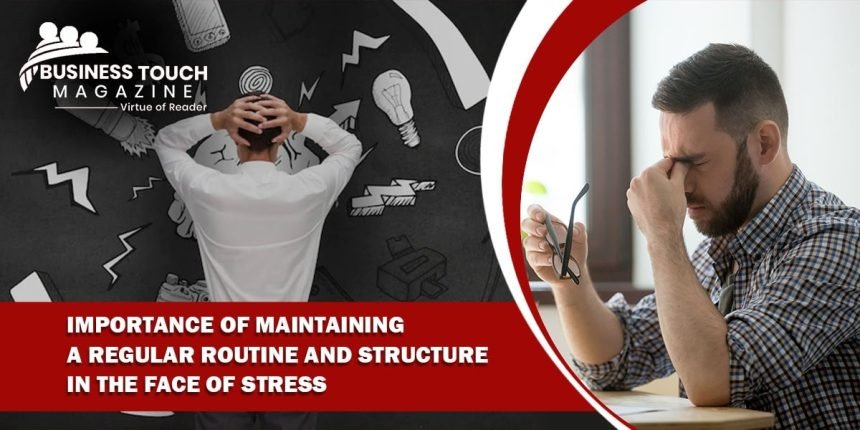Some individuals like the stability of a set daily routine, while others cringe at the idea. On the other hand, maintaining structure and regularity might make you feel more organized and in control during times of extreme stress.
A routine may be beneficial at any time, especially if you attempt to create good habits. However, these patterns can be especially crucial when some elements of your life seem unclear.
Many people’s typical routines have been drastically affected due to the COVID-19 pandemic’s interruptions, making it even more challenging to deal with the stress that individuals are experiencing.
A Sudden Lack of Structure
For many individuals, the choice is between working from home or facing an uncertain time of being unemployed. When working from home, it’s easy to become bogged down in the solitude and lack of a regular routine.
The absence of regularity or structure might heighten your discomfort and draw your attention to the root of your troubles. When individuals lack discipline and are left with nothing else to occupy their time, they are more likely to dwell on the unpleasant circumstance, which may lead to even greater anxiety, says Rachel Goldman, a psychologist and clinical assistant professor at the NYU School of Medicine.\
Maintaining a daily schedule and routine might help you break the loop of obsessive thinking about what’s causing your stress.
The Benefits of Having a Routine
Routines have been proved repeatedly in research to be helpful for mental wellness. According to one research, routines may help individuals better cope with stress and anxiety.
Maintaining a regular schedule may provide the following benefits:
- Reduced levels of tension
- Establish healthy daily routines.
- Improve your health and productivity by taking better care of yourself and focusing your attention.
Delegating jobs that aren’t required may allow you to engage in healthy habits like regular physical activity and pursue interests that delight you.
Focus on Things You Can Control
Taking responsibility for your own actions might give you a greater sense of control over your surroundings. You should concentrate on the things you can control, according to Goldman.
Create a routine that gives your day structure and consistency. Even though your schedule may vary somewhat from day to day, adhering to a basic pattern for when you arise, eat, work, play, and sleep may help you feel less stressed and more organized.
By planning your day, you’ll be more likely to complete the essentials, which will free up time for you to work on the things you really want or need to get done.
Follow a Routine That Supports Your Health
It is possible to include stress-reducing activities into your everyday routine. These are some examples:
- Maintaining a healthy and active lifestyle
- ensuring enough sleep is a priority
- Eating nutritious food daily
- Setting objectives that are attainable but not unrealistic
- trying to have an optimistic outlook on things
- planning ahead of time, yet not dwelling on issues beyond your control
- Meeting up with old friends and making new ones
- Allowing yourself time to do things you like
The circumstances in which you find yourself might impact how simple or difficult it is to keep to a daily routine. As a result of COVID-19, many individuals have been forced to take time off work owing to mandatory stay-at-home orders. It’s essential to discover activities that will keep you occupied and avoid indulging in harmful or unproductive habits.
Make Your List
Make a day-to-day to-do list. This is a great way to stay organized. Everything from work to dinner prep to housework should be included in your to-do list. Once you have a broad concept of what you need to get done, you can begin drafting a daily schedule to help you remain on track.
When you’re under much pressure, it is not easy to focus on the things that matter. Making a list of your daily responsibilities might help.
In addition to completing the necessities, make time for enjoyable activities, such as watching a favourite program or talking to a friend. Maintaining a positive attitude and concentration while working on a subject you don’t really love is easier if you include little incentives into your daily routine.
Find What Works for You
Are planned daily schedules preferable or simply a generic to-do list? Some individuals may benefit from a daily plan that is highly organized and breaks down activities into precise blocks of time, while others may benefit from a more free-form list of tasks to be completed.
What factors do you take into account while deciding on a strategy? Take into account both your own incentives and the tasks you need to accomplish. When it comes to completing a task of significant priority, Goldman advises scheduling it into your daily routine and carving out the time required to achieve it.
Set aside a set period each day to do those chores that are most important to you. You’ll be able to manage your time better if you know exactly how much time you dedicate to each of these things. Goldman also says scheduling tasks you may not be motivated to do is a good idea.
Set aside a set period each day to do those chores that are most important to you. You’ll be able to manage your time better if you know exactly how much time you dedicate to each of these things. Goldman also says scheduling tasks you may not be motivated to do is a good idea.




